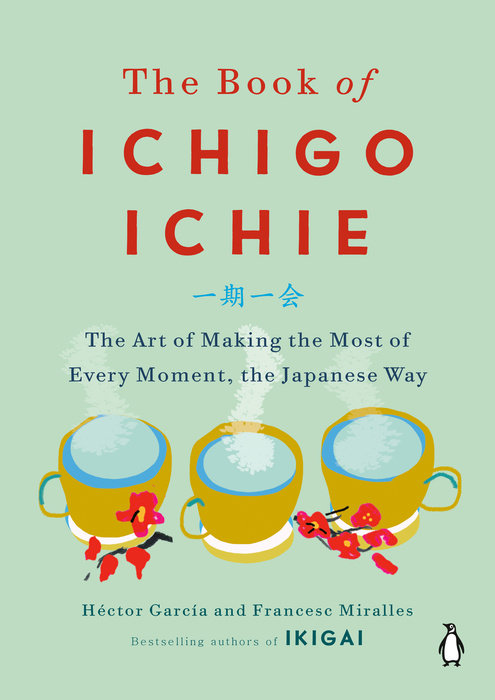
The Book of Ichigo Ichie: The Art of Making the Most of Every Moment, the Japanese Way
Héctor García, Francesc Miralles
About the Author

Héctor García
Questions & Answers
The concept of 'ichigo ichie' challenges our conventional understanding of time by emphasizing the uniqueness and irreplaceability of each moment. It transforms experiences by encouraging us to fully engage with the present, valuing every encounter as a precious opportunity. This shift in perspective fosters mindfulness, helping us appreciate the fleeting nature of life and the beauty of impermanence. In relationships, 'ichigo ichie' promotes deeper connections by urging us to cherish each meeting as a unique and irrevocable experience, fostering gratitude and a sense of shared preciousness. By embracing this philosophy, we can lead more fulfilling lives, unburdened by the past or anxious about the future, and fully present in the moment.
The 'ichigo ichie' philosophy emphasizes the preciousness of each moment, as it is unique and unrepeatable. Key elements include:
- Appreciating Impermanence: Recognize that everything is transient, including relationships, experiences, and even our own lives.
- Living in the Present: Focus on the current moment, rather than ruminating on the past or worrying about the future.
- Valuing Every Encounter: Treat every meeting, whether with strangers or friends, as a special opportunity that may never recur.
- Creating Unforgettable Moments: Seek out and create unique experiences that can be cherished and remembered.
Practical applications include:
- Mindful Living: Engage fully in daily activities, savoring each experience.
- Tea Ceremonies: Participate in or create simple tea ceremonies to appreciate the moment and the company.
- Active Listening: Listen attentively to others, showing genuine interest and appreciation.
- Embrace Chance: Occasionally make decisions based on chance to introduce variety and spontaneity.
- Celebrate Life: Turn every day into a celebration, finding joy in the little things.
The book leverages cultural and philosophical concepts like wabi-sabi, kintsugi, and Zen meditation to reinforce the 'ichigo ichie' philosophy. Wabi-sabi, the appreciation of imperfection and impermanence, aligns with 'ichigo ichie' by emphasizing the beauty in fleeting moments. Kintsugi, the art of repairing broken ceramics with gold, symbolizes the value of embracing life's imperfections and healing, mirroring the philosophy's focus on cherishing each unique moment. Zen meditation, particularly zazen, teaches mindfulness and living in the present, which is central to 'ichigo ichie.' These concepts collectively encourage a life of appreciation, mindfulness, and embracing the transient nature of experiences.
Embracing the 'ichigo ichie' philosophy can lead to numerous benefits, enhancing the quality of life. This concept emphasizes the preciousness of each moment, encouraging mindfulness and appreciation. By valuing each encounter as unique and unrepeatable, individuals can:
- Live more fully in the present: Reducing anxiety about the future and regret about the past, leading to a more content and peaceful existence.
- Enhance mindfulness: Focusing on the here and now, leading to better decision-making and a deeper connection with oneself and others.
- Create unforgettable experiences: Seeking out and cherishing unique moments, which can lead to a more fulfilling life and richer memories.
- Develop empathy and connection: By fully engaging with others, one can foster deeper relationships and a sense of community.
- Cultivate gratitude: Recognizing the value of each moment can foster a sense of thankfulness and contentment.
In essence, 'ichigo ichie' can contribute to a more meaningful life by encouraging individuals to live with intention, appreciate the fleeting nature of existence, and create lasting, positive experiences.
The book tackles the challenges of a distracted and fast-paced world by emphasizing the concept of "ichigo ichie," or "once in a lifetime" moments. It argues that our constant distractions and preoccupation with the past or future rob us of the present. To counteract this, the book proposes several strategies:
-
Mindfulness: Encouraging a focus on the present moment through practices like meditation and mindfulness, which help individuals become more aware of their thoughts and surroundings.
-
Attention: The book stresses the importance of paying full attention to others and the world around us, suggesting that this can be cultivated through active listening, observing details, and being fully present during activities.
-
Appreciation: By valuing each moment as unique and unrepeatable, the book encourages readers to appreciate the beauty and significance of everyday experiences.
-
Simplicity: It advocates for a simpler, less cluttered life, suggesting that by removing distractions and focusing on essential tasks, one can better enjoy the present.
-
Connection: The book promotes the idea of forming deeper connections with others and the world, which can be achieved through shared experiences and collective mindfulness.
By implementing these strategies, the book aims to help readers cultivate a deeper appreciation for each moment, leading to a more fulfilling and meaningful life.